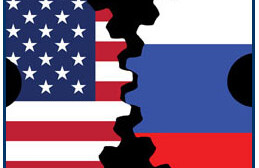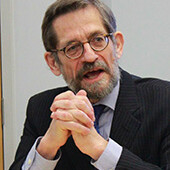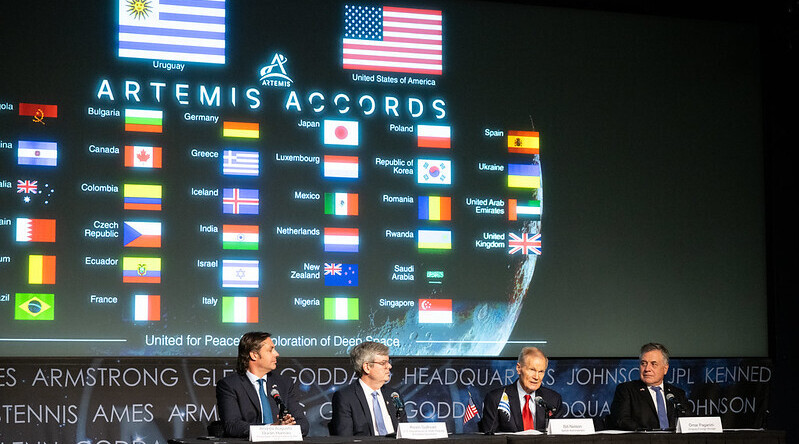This paper was presented at a conference entitled "Carnegie Council's Program on U.S. Global Engagement: a Two-Year Retrospective."
The conference took place at the Pocantico Center of the Rockefeller Brothers Fund from June 1-3, 2011. Organized by the Carnegie Council in cooperation with the U.S. Army War College, the conference served to review and report on two years of program activity, and to generate new ideas and resources among an international group of innovative thinkers on U.S.-Russian relations, nuclear arms control and nonproliferation, European and NATO security challenges for the future, including Afghanistan, and competition and cooperation in the Arctic region.
The U.S. Global Engagement program gratefully acknowledges the support for its work from the following: Alfred and Jane Ross Foundation, Rockefeller Brothers Fund, Donald M. Kendall, Rockefeller Family & Associates, and Booz & Company.
The reset is over. Launched by President Obama upon taking office in 2009 and
later embraced by President Medvedev, it has repaired U.S.-Russian relations
after their collapse in the wake of the Russia-Georgian war of August 2008.
Personal rapport between the presidents has undergirded a more general warming
in relations, as the Bilateral Presidential Commission, set up in the summer
of 2009, fosters dialogue and cooperation between the two governments on a wide
range of security, political, and socio-economic matters.
More important, the reset has yielded concrete results that have advanced U.S.
interests. The new START made a modest contribution to strategic stability and
the restoration of trust between the two governments. Russia helped increase
pressure on Iran to renounce any nuclear weapons program by agreeing to tough
new UN Security Council sanctions. Russia's ensuing decision to cancel the sale
of the sophisticated S-300 air defense system to Iran reduced the near-term
risk of war (many observers had argued that Israel would have to attack Iran's
nuclear sites before deployment of the S-300's prohibitively raised the costs).
Russian support for the Northern Distribution Network has facilitated the supplying
of U.S. and NATO troops in Afghanistan. That support has only grown in value
as U.S. relations with Pakistan, which controls the other major supply route,
rapidly deteriorate.
Russia has also drawn clear benefits. The Obama administration eased Russian
concerns about the expansion of NATO into the former Soviet space by putting
the question of Ukrainian and Georgian membership on hold for the indefinite
future. It tempered the United States' earlier aggressive competition with Russia
for power and influence in the former Soviet space. It reconfigured the architecture
for the U.S. missile defense system in Europe, abandoning deployments in Poland
and the Czech Republic that had drawn vehement protests from Russia, and displayed
a willingness to consider Moscow's call to rethink European security architecture.
In a nod to Kremlin sensitivities, the administration toned down official criticism
of Russian domestic affairs.
In short, the reset has normalized U.S.-Russian relations. In almost any other
bilateral relationship, normalization would relieve much of the suspense, as
the two countries turned to the routine management of affairs. Competition would
continue on specific issues, but within limits that did not jeopardize overall
relations. The United States and Russia are not just any two countries, however.
Confrontational mindsets linger from the bitter Cold-War rivalry—and a
longer history of uneasy relations. Consequently, their bilateral relations
cannot just drift along in the routine management of affairs. They drift either
upward toward closer cooperation or downward toward sharper competition—and
eventually conflict.
For this reason, the success of the reset does not provide a moment of strategic
repose. It compels the question, what next? What should the two countries aspire
to now, so as to foreclose a return to dangerous geopolitical rivalry and hold
open the promise of mutually advantageous strategic partnership? Neither the
Obama Administration nor the expert community has offered a clear direction.
Meanwhile, relations have already entered a rough patch. By most accounts, Obama's
meeting with Medvedev on the margins of the G-8 summit in Deauville, France,
on May 26, 2011 revealed growing—if still far from debilitating—strains.
Missing Constituencies, Elusive Public Support
The strains arise from obvious conflicts of interests—over European security,
the former Soviet space, missile defense, values, and other matters. As such,
they are standard fare in any bilateral relationship. What makes U.S.-Russian
relations more precarious, however, is the absence of strong constituencies
and public support for improved relations that can help blunt the impact of
conflicts and provide a framework in which they can be managed.
The problem of missing constituencies is long-standing. For the century before
the demise of the Soviet Union, with perhaps the brief interlude of the Second
World War, American elites were either indifferent or, more often, hostile to
Russia. The hostility was grounded in geopolitical competition between two powers
with vital, and expanding, interests in both Europe and East Asia, especially
during the Cold War. It also grew out of a vast gap in values between a democratic
America and an authoritarian Tsarist or Soviet Russia. American elites, unlike
some of their European counterparts, were never infatuated with Russia's socialist
experiment in 1920s and 1930s.
The hostility and indifference briefly gave way to enthusiasm and intensive
engagement during the first decade after the Soviet breakup, as Americans sought
to facilitate what they thought was Russia's inevitable transition to a free-market
democracy along American lines. But the indifference returned after Russia's
financial collapse of August 1998, which put an end to illusions of a rapid
transition to democracy and free markets, and the hostility shortly thereafter
as Russia under Putin rebuilt its power and began to challenge the United States,
particularly across the former Soviet space.
Even during the period of enthusiastic engagement, constituencies did not emerge
that could have laid a firm foundation for constructive long-term relations.
Americans providing assistance never treated a Russia in disarray as an equal;
those focused on security matters—such as non-proliferation—hoped
to exploit a period of Russian weakness to contain, if not eliminate, the threats
they saw emanating from Russia. For America in the 1990s, Russia was a problem
to fix, not a partner to solve global problems.
Many observers now believe that the business community could provide the missing
constituency. Indeed, in part out of that belief, the Obama administration seeks
to facilitate Russia's entry into the World Trade Organizations and encourages
American business to participate in Russian programs and policies that support
innovation and modernization. But this belief is surely misplaced. U.S. trade
with Russia amounts to roughly 1 percent of overall U.S. trade, and U.S. investment
in Russia pales in comparison to U.S. investment in Europe, Japan, China, and
a number of other countries. An exponential growth in trade and investment that
could turn the business community into an influential constituency for better
relations is not on the horizon. The hard truth is that U.S. trade with Russia
is small not simply because of existing barriers but, more importantly, because
of a fundamental lack of complementarity between the two economies. Neither
country produces much that the other wants. As for investment, Russia is only one,
and far from the most attractive, of many destinations in emerging markets.
Given the lack of constituencies and the continuing economic woes, it is hardly
surprising that the reset has not captured the public's imagination. More to
the point, its achievements are not immediately obvious to a public buffeted
by continuing economic woes and deepening concerns about America's future. Take
the new START. Even if Russia theoretically remains the only country that could
annihilate the United States in 30 minutes, with the demise of the Soviet
Union as an existential foe, the public no longer lives in fear of a nuclear
war with Russia. How important can a new arms control agreement be? Or take
Iran. Few believe the current UN Security Council sanctions will deter Iran
from pursuing the development of nuclear weapons, and it is far from certain
how much further Russia is prepared to go in putting pressure on, or in isolating,
Teheran. What then has Russian cooperation on Iran offered in practical terms
that will reduce the threat to the United States? Or take Afghanistan. The Russians
are supporting the Northern Distribution Network in the hope that the United
States will remain engaged in a conflict from which Americans increasingly want
to withdraw. This is an achievement?
What might capture the public's imagination? Missile defense cooperation once
seemed promising. What could be a more powerful symbol of the benefits of U.S.-Russian
partnership than cooperation in building a system designed to defend both Americans
and Russians from common enemies? But a genuinely joint system always lay in
the realm of fantasy. No American administration would ever consider making
the defense of the United States even marginally dependent on a Russia that
is still more a rival than a partner. And lesser forms of cooperation or coordination
of efforts—the sharing of early warning data, for example—would do
little to excite the American public, even if the Russians were interested,
which they are not. Whether there are other initiatives that could capture the
public's imagination is not certain. What is, is that the Obama administration
has not found any.
In the absence of strong constituencies and public enthusiasm, the full burden
of improving relations has fallen on the two governments, specifically on the
presidents operating on their assessments of their respective national interests.
For the past two years, Obama has been intensely engaged—he has probably
had more contact with Medvedev than with any other foreign leader—in the
conviction that Russia could make a significant contribution to the achievement
of his top foreign-policy goals: laying the foundation for a world without nuclear
weapons, ending Iran's nuclear-weapons program, and bringing the "necessary"
war in Afghanistan to a satisfactory conclusion. That engagement was crucial
to the success of the reset. It helped discipline the American bureaucracy,
ensuring that the various government agencies remained focused on his priorities
and did not pursue policies—such as more robust support for Georgia, which
had many advocates, particularly in the Defense Department—that would have
put the reset at risk. In addition, Obama's personal active engagement demonstrated
a seriousness of purpose that persuaded an initially skeptical Russian leadership
to pursue the reset.
But it is inconceivable that Obama will devote as much time and energy to Russia
during the remainder of his presidency. The administration has yet to formulate
a goal that would justify his continued intensive engagement, particularly given
the pressing domestic problems of the deficit and debt and a grievously underperforming
economy; other more urgent foreign policy matters, including the Middle East,
Afghanistan, and China; and a rapidly approaching election campaign. Without
Obama, who or what will keep relations on track, let alone drive them forward?
The administration has not provided an answer.
So are relations doomed to drift downward? Not necessarily, but it will take
more imagination and effort than now on display in both the administration and
the expert community to avoid that outcome.
Toward a Common Strategic Purpose
Great-power cooperation, in the end, is most extensive when it is grounded in
a common strategic purpose, which takes precedence over shared values. To be
sure, shared values can—and usually do—reinforce and invigorate interest-based
cooperation, but the interests still must come first. History makes that clear.
Despite unbridgeable gaps in values, the United States cooperated with the Soviet
Union in the defeat of Nazi Germany and, more closely, with China in containing
Soviet expansionism in the 1970s and 1980s, because it was in the vital interest
of both countries concerned to do so in each case. By contrast, a shared system
of values grounded in American and European experience has not prevented the
erosion of the cohesion of the Transatlantic Community during the past 20
years after the loss of the existential Soviet threat, which had given the Community
its original common strategic purpose.
In the absence of a common strategic purpose, cooperative relations between
great powers are inevitably grounded in trade-offs. Each country helps the other
in the achievement of a limited range of its primary interests in exchange for
help in the achievement of its own priorities. That is in essence the way the
reset has moved forward, even if the Obama administration argues in public that
it has not made any trade-offs or sacrificed any, even secondary or tertiary,
interests to improve relations with Russia. Certainly, this approach provides
a possible framework for pursuing cooperative U.S.-Russian relations further,
but it has its inherent limits, particularly given the tendency in American
circles to see the necessary trade-offs as compromises of principle. This approach
may turn out to be the best possible, but the elaboration of a common strategic
purpose would provide a much more solid foundation.
Do the United States and Russia share a common strategic purpose? If not, can
they find one? American and Russian leaders speak of shared interests—strategic
stability, non-proliferation, and counterterrorism, among others—that support
current cooperation. But a compilation of shared interests does not add up to
a common strategic purpose. That requires an interest or interests of overwhelming
importance to both countries. The areas of cooperation identified so far do
not meet that standard. Indeed, one key problem in relations is that each country
assigns different priorities and interpretations to the shared interests. The
United States, for example, considers the proliferation of weapons of mass destruction
(WMD) to rogue states or terrorist organizations to be perhaps the primary international
threat to its national security—and from that assessment flow the more
specific concerns about Iran and North Korea. Russia might share the interest
in preventing WMD proliferation, but various national security documents indicate
that that is not the top threat in Russian eyes. Because of other considerations,
Russia is not prepared to press the Iranians and North Koreans nearly as hard
as the United States would like it to on their nuclear programs. Similar arguments
can be made for other shared interests.
And so, a common strategic purpose remains to be discovered.
The search begins with the current state of world affairs, from the recognition
that the world has entered a period of great turbulence. As is now widely acknowledged,
the old world order based on Western unity and dominance has broken down. A
new one will emerge in time out of the fundamental trends now visible: the shift
in global dynamism from Europe to Asia, from the Atlantic to the Pacific; the
historic struggle in the Middle East between modernity and traditionalism, between
closed and open political systems; the growing contradiction between globalized
financial flows and commercial interactions and nationally-based regulatory
systems; the mounting threats from the dark side of globalization—proliferation
of weapons of mass destruction, international terrorism, climate change, pandemic
diseases, and so on; the increasing pressure on sovereign nation-states—the
fundamental unit of world affairs since the Peace of Westphalia in 1648—from
transnational forces and sub-regional actors.
What is less well understood is the novelty of the current situation for both
the United States and Russia.
The United States, for the first time since it emerged as a great power a century
ago, is engaged in a world that is multipolar, global, and globalized. Moreover,
it is no longer the rising power it was during the 20th century, and its current
fiscal straits will compel it to make a more judicious use of its power than
previously. As a result, the United States' traditional approaches to global
affairs are no longer adequate. It cannot practice the isolationism it did until
the outbreak of the Second World War, given the extent to which American security
and prosperity depends on what happens beyond its borders, as well as America's
own centrality to world order as the preeminent power. Nor can the United States
focus on a single existential threat as it did during the Second World War (fascism
in the guise Nazi Germany and Imperial Japan) and the Cold War (the Soviet Union)
or organize its foreign policy around a single overarching goal, such as unconditional
surrender in the Second World War or containment in the Cold War.
Now the United States must engage a wide range of great and regional powers,
few of which are wholly friend or wholly foe, in a world where leadership will
be shared or contested and the global agenda will not be set in Washington but
grow out of the conflicting interests and priorities of various powers. The
United States will need to deftly balance competing interests to build stable
structures of security and economic management capable of protecting and advancing
its interests. Those structures must be built around the globe, as the foundation
of a new world order, but particularly in Northeast Asia, South Asia, the Middle
East, and Europe, the regions of strategic importance in the world today because
of their economic capacity or control of critical energy resources.
Meanwhile, Russia, for the first time since it emerged as a great power over
300 years ago, is no longer the dynamic core of Eurasia. Rather, it
is now surrounded by countries and regions more dynamic than itself, economically,
demographically, and politically. China's robust economic growth and vigorous
search for resources, the Islamic world's burgeoning ferment, and Europe's grand
project of integration (despite recent difficulties) all impinge on Russian
interests, projecting their own influence into Russia and its neighborhood or
acting as powerful poles of attraction pulling Russia and its neighbors in multiple
directions. Russia's great strategic challenge going forward is two-fold: (1)
recreating itself as the dynamic core of Eurasia and (2) building stable structures
of security and economic integration along its entire periphery, from Northeast
Asia through Central Asia and the Caucasus to Europe.
As this brief analysis suggests, the United States and Russia face major strategic
challenges along Russia's periphery, and, in sharp contrast with the situation
during the Cold War, those challenges are not dissimilar. Nevertheless, in large
part because of that Cold War experience, each side still tends to view the
other as a strategic competitor rather than a possible partner in Eurasia. A
large segment of the American political establishment sees a neo-imperial Russia
bent on restoring its lost empire; an overwhelming share of the Russian elite
considers the United States to be a hegemonic power determined to hem in and
weaken Russia.
But the truth is that neither country poses the central strategic threat to
the other along any segment of Russia's periphery, and sharp competition between
the two plays to the advantage of third powers and forces. A rising China, with
an insatiable appetite for natural resources and an increasingly assertive foreign
policy, is rapidly reshaping the geopolitics and geo-economics of Northeast,
Central, and South Asia, potentially to the detriment of the interests of both
the United States and Russia. Radical Islamic fundamentalism is penetrating
the fragile states of both the Caucasus and Central/South Asia, promoting instability
and fostering terrorism that threaten both the United States and Russia. And
strategic disarray in Europe creates tension in Eastern Europe and detracts
American, Russian, and European effort from the more serious threats that emanate
from beyond Europe. In this environment, the United States and Russia would
both gain by working together, rather than at cross purposes, to build new structures
of security and prosperity. To this end, and contrary to prevailing opinion
in both countries, the United States would benefit from a robust Russian presence
throughout the former Soviet space, as Russia would from an active American
presence along its entire periphery.
* * *
The big question going forward is this: Can the United States and Russia finally
put their zero-sum competition in Eurasia behind them so that they can concentrate
on the common strategic challenges before them? Can the two countries overcome
the past in order to secure the future? Can they forge a common strategic purpose
in Eurasia? The short answer is that we do not know. But what is remarkable
is that, despite the warming of relations, the main strategic challenges have
yet to be addressed vigorously and honestly in official channels. The two countries
do not discuss China as a common problem, in part because they do not want to put
at risk their respective relations with a rising power. The two countries do
not discuss the former Soviet space as a common strategic challenge in part
because each is keenly aware of the recent past of acute competition there.
Ironically, however, avoiding these critical, potentially divisive issues helped
create the conditions for the reset's success, while now only confronting them
and transforming them into a common strategic purpose offers a positive path
forward beyond the reset.




